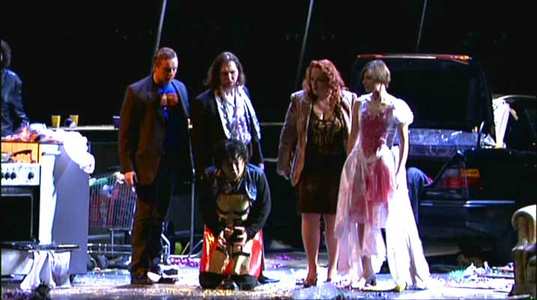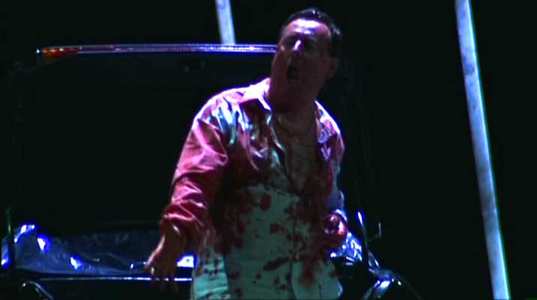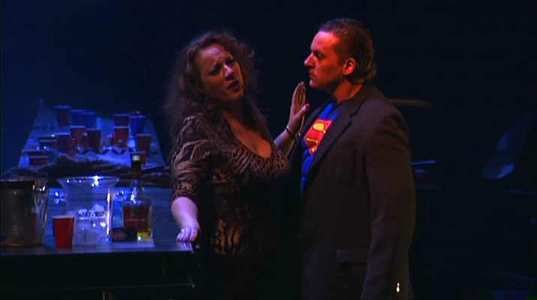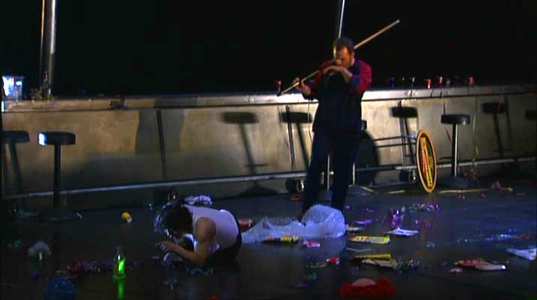Mozart: Don Giovanni (de Billy)
Introduction
Mozart`s great `Dramma giocoso` from 1787 about the debauched life of the eponymous character, and his final downfall at the hands of his victims.
Don Giovanni is a Spanish nobleman renowned throughout Europe as a great seducer (as he would call it) or rapist and murderer (as everyone who comes across him would say), and travels with his servant Leporello, whose main role is to act as a lookout.
His latest `conquest` is Donna Anna, who manages to escape his clutches and chase him out. Her father, the Commendatore catches up with Giovanni, but is killed for his trouble. Donna Anna and her lover, Don Ottavio seek revenge.
Leporello contsantly attempts to get his master to change his ways, but this time is interrupted by one of the Don`s exes, Donna Elvira, who is most likely in love with Giovanni. Leporello explains in great detail that she is not exactly the only woman in his life - he`s had 1003 in Spain alone!
The Don`s next bit of fun is to try and seduce the peasant Zerlina, who is about to get married to Masetto (he never lets social standing get in the way of a good relationship - however brief). Zerlina interrupts yet again, and explains to Anna and Ottavio the Don`s true character after they appeal to him to help find her father`s murderer. Donna Anna then recognises the Don as the man she`s hunting.
The Don is holding a masked ball, and Anna, Ottavio and Elvira have been invited. They plan to take revenge. During the ball, he again attempts to seduce Zerlina, but she doesn`t put up with it and asks everyone to stand up against him, which they try to do, but Giovanni and Leporello escape.
Giovanni now targets Elvira`s maid, and swaps clothes with Leporello so that his own servant can lure Elvira elsewhere. While disguised, Masetto appears intent on killing Giovanni, but doesn`t recognise the Don in front of him, who takes adavantage, and beats Masetto to a pulp before disappearing.
In the meantime, Leporello is still in disguise himself and is challenged by Masetto, Zerlina, Ottavio and Anna when he turns up with Elvira. He quickly shows them who he actually is, and yet more death is vowed upon the Don, even though Elvira is secretly still in love with him.
The Don and Leporello are hiding in a mausoleum, when they hear the ghost of the Commendatore demanding repentance. Giovanni arrogantly orders Leporello to invite the ghost to supper instead.
A little later, the Don is eating supper at home to be interrupted by Elvira yet again. She begs him to repent his actions, but he refuses. Another visitor arrives, in the shape of the Commendatore. He too demands Giovanni`s repentance, but after several more refusals, drags Giovanni down to Hell.

Video
The usual NTSC 16:9 anamorphic picture, however there are some severe problems with transferring the stage produciton on DVD. Much of the lighting creates some shocking over-exposure on faces, and costumes, so that details are completely lost, and when this isn`t the case, it is often too dark to see anything.
There are also more examples of the all-to-familiar camera wobbles and focussing problems I`ve begun to get used to in productions from this theatre.

Audio
The sound doesn`t fare much better.
Whether in LPCM Stereo or DTS, we are bombarded by the clumping of feet on the stage, which is quite often just as loud as the music. When we are actually able to listen to the music without too many other interferences, the balance is often so poor that the voice almost disappears completely (very noticeable during `Fin ch`han dal vino`). I was often reminded of the `Singin` in the Rain` sequence when everyone was having problems speaking way from the microphone so you only hear every other word.

Features
Extras are limited to pictures of the cast, and an illustrated synopsis - again with stills from the production. Subtitles are in English, French, Italian, Spanish, German and Catalan.
There is also a short description of the creation of the opera, together with some explanation of this particular production.
For some reason, the `chapter` numbers within the booklet refer to `those in Mozart`s score` and not the DVD chapters. What`s the point of that?

Conclusion
The production of this greatest of operas is an interesting one. It has been udpated to relatively recent times, and the Don is not so much a nobleman, as a jumped-up thug who appears to have very little nobility going for him at all. Unfortunately, neither do any of the other characters, and this leaves us not really caring much about them whatsoever. The whole things reeks of seediness, and it feels as if the director has tried to grab our attention with another `clever` idea that the music begins to take second place.
To begin with, I wasn`t at all happy with the final scene, which shows the Don seemingly going mad after taking a variety of drink and drugs - so rather than being literally dragged into Hell, he just sinks to the floor a simpering wreck. Whether the reappearance of the Commendatore is all in his mind or not is left up in the air.
Musically, I was also quite unimpressed.
Bertrand de Billy`s tempi are generally on the fast side, and although there`s nothing necessarily wrong about that, much of the depth is missing, especially during the darker sections. The opening of the overture should give some sense of impending doom, but it was over and done with so quickly I wondered whether there was some from of pressing engagement everyone had to get to afterwards.
Speed also didn`t help some of the ensemble work. The opening of the wedding scene in Act 1 (`Giovinette che fate…`) is just messy all round, and the soloists struggle to get the words out in time (and in tune), although the frantic choreography obviously doesn`t help. I also wished de Billy would have given us just a little more time before some of the arias. As it is, some of the soloists are almost caught out
Wojtek Drabowicz (Giovanni) creates a believable character, and appears to sing very well (through the recording`s techincal problems), but the director`s ideas as to the Don`s personality and his interaction with the other characters is completely wrong, and so makes a mockery of the whole story.
The only person to come out this with some merit is Kwanchoul Youn (Leporello), the Korean baritone, who delivers a fine performance, and deservedly earns one of only two rounds of applause during the performance.
I`m willing to accept that all this came across a lot better in the theatre itself, but for DVD, and with the Harnoncourt (and even Karajan!) being far more musically satisfying, it really doesn`t pass muster.
Your Opinions and Comments
Be the first to post a comment!